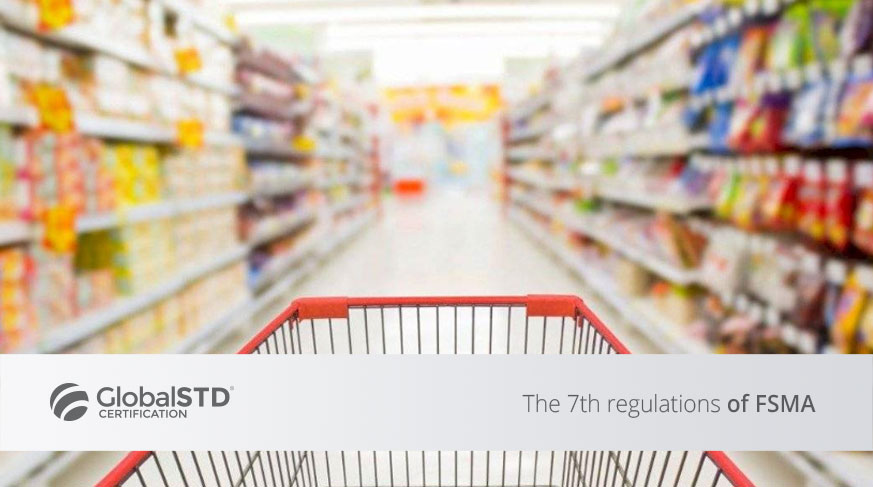
The 7th regulations of FSMA
President Obama in 2011 signed FMSA, a work regulation set that changed the American Food Safety Systems for more than 70 years. The FDA published seven major regulations under FSMA, each one establishes new requirements creating responsibility in the industry to prevent pollution of food suppliers, instead of reacting to these issues.
*FSMA regulations do not cover the meat, birds, and processed eggs, these are regulated by the United States Department of Agriculture (USDA).
To whom applies this regulation?
The regulation acknowledges the links of the production chain and food supply that will be inspected for complying with the FSMA regulations. From the producer to those related to the production process, transformation, transport, and distribution affecting the animal or human consumption products.
Regulations
FSMA has added 7 new regulations focused on preventing and reacting to possible food safety matters involving companies in the United States and abroad.
| Regulation | Proposal | Final (consent decree) |
| Preventive control (food for humans) | January 16th 2013 | August 30th 2015 |
| Preventive controls (animal food) | October 29th 2019 | August 30th, 2015 |
| Fresh products | January 16th 2013 | October 31st 2015 |
| Verification Program of Foreign Supplier | July 29th 2013 | October 31st, 2015 |
| Third Parties Accreditation | July 29th 2013 | October 31st 2015 |
| Sanitary transportation | February 5th 2014 | March 31st 2016 |
| International adulteration | December 24th 2013 | May 31st, 2016 |
Preventive Analysis and Risk Control for Human Food Consumption
Request establishments under this regulation to have a written plan about food safety, preventive analysis, and controls for identified risks. Reviews and updates regulations on Good Production Practices (CGMP,) including allergens protection, and cross-contamination and updates the content of these activities.
The Fresh Field Safety Regulations/PSR
The regulations establish standards in the following areas:
- Employee training, health, and hygiene.
- Agricultural water uses.
- Soil with biological improvements of animal origin.
- Domestic animals and wild animals.
- Production, harvest, handling and packaging activities.
- Equipment, tools, and constructions.
- Germinate.
If this regulation does not comply, the food is considered an adulterer and rejected.
Third-party auditors and certifiers accreditation regulation
It establishes eligibility requirements for accreditation bodies or outsourced auditors, to be acknowledged by the FDA. An accreditation body may be a government office or a private third party (like the government or a foreign company). The accreditation bodies and third-party auditors shall comply with certain standards, like have the legal authorization, competition, capacity, impartiality, objectiveness, quality assurance, and procedure recording.
The Preventive Animal Feed Controls (HARPCA)
The goal here is to prevent issues with animal food. Establishments are required to comply with Updated Good Production Practices (cGMPs) implementing preventive controls for identified risks.
Including establishments that manufacture, process, packs and handles animal food under FSA registration, and the Bioterrorism regulation. Also, the cGMPs were established for the first time for businesses that manufacture, process, packs, and handle animal food. A food safety plan shall have a written document on the risk’s analysis, preventive controls, and preventive control guidelines, and frequent application; also, a written document on corrective procedures, verification procedure, a retirement plan, and a supply program.
A Foreign Supplier Verification Program (FSVP)
The importer shall develop some specific fundamental activities for verifying risks in each imported food produced, providing the same level of security requested by the American producers and complying with adulterer requirements and mislabeling established in the PSR, HAPC, and FDCA.
The importer handling food establishments under any verification disposition of suppliers, including preventive control regulations shall consider complying with FSPV regulations.
* A qualified individual shall develop and apply this program.
The program content includes:
- A food risk analysis for each food the importer imports.
- A supplier’s verification to control identified risks.
- Corrective actions managing complaints.
- Periodic evaluation of the FSVP.
- Importers identification.
- A logbook for each performed activity.
Regulations for sanitary delivery of humans and animals’ food
Serves to guarantee a safe delivery from any type of risks, the goal for this regulation is:
- Not complying with suitable food refrigeration.
- Cleaning vehicles in between loading.
- Not complying with proper protection when delivering food.
This secures a hygienic delivery for:
- Shippers
- Carrier
- Recipient
It covers food and animal feed.
* This regulation is based on the updated practices of food safety delivery.
Regulation for protecting food against unintentional adulteration
The owner, operator or head agent of an establishment, under this regulation, shall prepare or implement a food defense plan which shall include:
- Identifying an actionable process step.
- Targeting mitigation strategies.
- Monitoring procedure.
- Corrective Actions.
- Verification.
Factors affecting FSMA compliance
- Integrating the operation productive chain of exportation.
- The adoption level of SRRC in the company.
- Type of product.
- The level of innovation of the company.
- The material uses in the production process.
- The risk level of the product.
